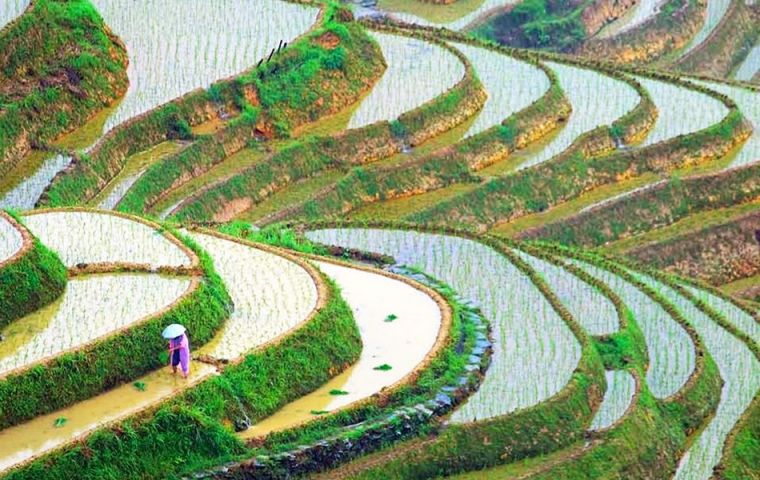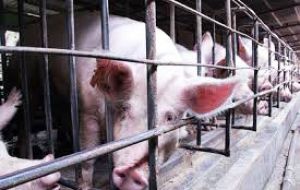MercoPress. South Atlantic News Agency
China superpower? It relies on imports for energy, iron and...water (for food)
 China not only is reliant on imported oil, natural gas and iron ore to power its economy, but water problems mean it must look overseas for food supplies.
China not only is reliant on imported oil, natural gas and iron ore to power its economy, but water problems mean it must look overseas for food supplies.  The country is largely self sufficient in pork, but supply is under threat due to water shortages across the North China Plain, the country's main food bowl.
The country is largely self sufficient in pork, but supply is under threat due to water shortages across the North China Plain, the country's main food bowl. Among the mountain of statistics produced by China every year, there is one impossible to ignore: according to the Ministry of Land and Resources 61.5% of China's ground water is too dangerous even to touch, which means that along with being unsuitable for agriculture or drinking this water is unfit for any human contact.
As a single figure it starkly highlights the environmental cost of China's rapid industrialisation over the last two decades, but also tells of Beijing's strategic vulnerabilities.
If this is to be the century of water and food security, then China is at a huge disadvantage, the disadvantage is not just confined to agriculture and the country's ability to feed itself.
China's water problems are now so severe they will begin to shape global energy markets and should influence the Pacific basin's trade policy and even defence posture.
In effect, China in the middle of 2015, not only is it in reliant on imported oil, natural gas and iron ore to power its economy, but its water problems mean it must increasingly look overseas for food supplies.
This reliance on imports led Geoff Raby, Australia's former Ambassador to Beijing, to label China a “constrained super power” and by extension a far less threatening actor in the region, since for example trade sanctions would devastate the Chinese economy.
Consider the situation with pork, the country's number one source of protein and a possible early casualty from its lack of water. China is largely self sufficient in this area, but supply is under threat due to water shortages across the North China Plain, the country's main food bowl.
China Water Risk, a not for profit group, believes this region will need to pipe expensive water from the south unless it completely abandons pork production. In reality such dramatic action is unlikely, but that does not preclude a gradual move towards imports.
In a few short years this would dramatically change the dynamics for the global pork industry, potentially opening up big markets for Canadian, European, Australian and South American producers, which have struggled with low prices for years.
China becoming a major pork importer would also echo across the entire agricultural sector, as it would likely drive up grain prices, the main feedstock used for fattening pigs. That in turn would likely push up prices for beef, chicken and eggs, a good outcome for farmers but a politically sensitive issue.
On the energy front, coal-fired power stations are significant water consumers, which could quicken China's switch to gas, wind and some forms of solar. The roll-out of nuclear energy to China's interior could also be constrained, as these reactors would rely on fresh water for cooling.
Then comes the broader cost to the Chinese economy. At the most basic level the contamination of China's ground water will require a huge cleanup effort, which will divert resources away from other areas.
The dean of Environment Studies at Renmin University in Beijing, Ma Jong, is on the record saying the total bill could run beyond 5 trillion yuan (1.04 trillion dollars). That's five times more than his estimates for the cost of cleaning up air pollution across the country.
This is China's problem: it does not have a lack of water so much, but a lack water in the right place.
According to the China Economic Review, 11 provinces and municipalities – including Beijing – have water resources below the World Bank's poverty mark. To make matters worse these areas are home to some 510 million people and include four of China's five top agricultural provinces.




Top Comments
Disclaimer & comment rules-

-

-

Read all commentsChina will never turn into a developed nation. They will revert to what they were soon enough just like every State controlled economy.
May 08th, 2015 - 11:15 am 0They will import more food and fuel until they run out of money.
Then they'll let their people starve.
Watch and see.
@1. How long before China needs its money back from failing latam?
May 08th, 2015 - 12:27 pm 0So China needs food, energy and iron.
May 08th, 2015 - 12:45 pm 0And Australia has food, energy and iron.
Woohoo so the A$55 billion in wealth that is transferred to Australia every year from China will only increase.
Commenting for this story is now closed.
If you have a Facebook account, become a fan and comment on our Facebook Page!